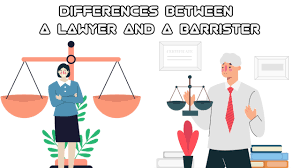When it comes to the legal profession, the terms lawyer and barrister are often used interchangeably. However, there are distinct differences between these two types of legal professionals. In this article, we’ll take a closer look at the key differences between a lawyer and a barrister.

Defining a Lawyer
A lawyer is a legal professional who provides legal advice and represents clients in legal matters. Lawyers may work in a variety of settings, including law firms, government agencies, corporations, and non-profit organizations. Lawyers are typically involved in all stages of legal proceedings, from drafting legal documents to representing clients in court.
To become a lawyer, one must obtain a law degree and pass a state bar exam. After passing the bar exam, lawyers may specialize in a specific area of law, such as criminal law, family law, or corporate law.
Defining a Barrister
A barrister is a type of lawyer who specializes in representing clients in court. In some legal systems, such as the United Kingdom, barristers are separate from solicitors. In these systems, solicitors are responsible for providing legal advice to clients and handling legal matters outside of court, while barristers are responsible for representing clients in court.
To become a barrister in the United Kingdom, one must first obtain a law degree and then complete a one-year Bar Professional Training Course (BPTC). After completing the BPTC, aspiring barristers must secure a position as a pupil with a barristers’ chambers, where they will receive training in advocacy and courtroom skills. Once their training is complete, barristers may accept instructions from solicitors or directly from clients.
Key Differences between Lawyers and Barristers
While both lawyers and barristers are legal professionals, there are several key differences between these two types of legal professionals.
Training and Education
The training and education required to become a lawyer and a barrister are slightly different. To become a lawyer in the United States, one must obtain a law degree and pass a state bar exam. In contrast, to become a barrister in the United Kingdom, one must obtain a law degree, complete a one-year Bar Professional Training Course (BPTC), and complete a period of pupillage with a barristers’ chambers.
Roles and Responsibilities
The roles and responsibilities of lawyers and barristers are also different. Lawyers may work in a variety of settings, including law firms, government agencies, corporations, and non-profit organizations. They are responsible for providing legal advice to clients and representing clients in legal matters both in and out of court.
Barristers, on the other hand, specialize in representing clients in court. In some legal systems, barristers are separate from solicitors, who are responsible for providing legal advice to clients and handling legal matters outside of court.
Courtroom Advocacy
One of the key differences between lawyers and barristers is their level of courtroom advocacy. While lawyers may represent clients in court, they may not have the same level of courtroom experience as barristers. Barristers are trained in advocacy and courtroom skills, and their primary role is to represent clients in court.
In some legal systems, barristers are also responsible for drafting legal documents and providing legal advice to clients. However, their primary role is to represent clients in court and advocate on their behalf.
Fee Structures
The fee structures for lawyers and barristers can also be different. In some legal systems, such as the United Kingdom, barristers may charge fees on a “brief fee” basis, where they are paid a set fee for each court appearance. They may also charge additional fees for preparation time and written submissions.
Lawyers, on the other hand, may charge clients a variety of fee structures, including hourly rates, flat fees, and contingency fees.
Conclusion
In conclusion, while the terms lawyer and barrister are often used interchangeably, there are clear differences between these two types of legal professionals. Lawyers provide legal advice and represent clients in legal matters both in and out of court, while barristers specialize in representing clients in court and are trained in advocacy and courtroom skills.
The training and education required to become a lawyer and a barrister are also slightly different, with barristers in some legal systems being required to complete a one-year Bar Professional Training Course (BPTC) and pupillage with barristers’ chambers.
Overall, understanding the differences between lawyers and barristers can be helpful when seeking legal representation. Whether you need legal advice or representation in court, it’s important to find a legal professional with the expertise and experience to handle your specific legal needs.







